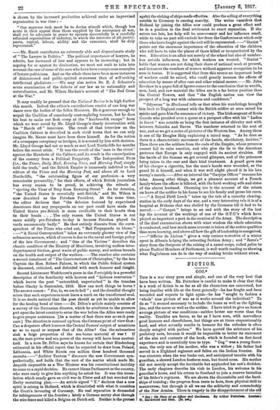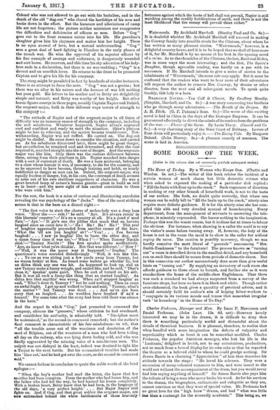FICTION,
G OG.•
Tuts is a war story pure and simple, and one of the very best that have been written. Mr. Fetterless is careful to make it clear that this is a work of fiction in so far as all tho characters are concerned, but being familiar with life at the front generally—he has fought and been wounded and expects to fight again—he has " sought to fashion a • whole' true picture of war as it works around the individual." To do so " it seemed necessary to include the home as well as the fighting line, and the nurse as well as the soldier. I have tried to give an honest average picture of war conditions—neither better nor worse than the reality. Troubles are borne, as far as I have seen, with marvellous good humour and cheerfulness, but things are at times unquestionably hard, and what actually results in humour for the onlooker is often deeply mingled with pathos." We have quoted the substance of his prefatory note, because it would be impossible to better its statement of the aim and contents of the book, which is founded on first-hand experience and is essentially true to type. " Gog " was a young Scots- man, the only son of his mother, who was a widow ; his father had served in a Highland regiment and fallen on the Indian frontier. He was nineteen when the war broke out, and anticipated trouble with his guardian, a shrewd London business man, but found none. His mother did not merely accept the inevitable but applauded her son's decision. The early chapters describe his visit to London, his welcome in his guardian's home, and his return to Scotland to join a reserve battalion of his father's regiment. We are shown the discomforts and the hard• ships of training; the progress from tents to huts, from physical drill to manceuvres; but through it all we see the solidarity and comradeship of the New Armies. There is tragedy in the disappointment of the old
•
W. Bla Gog sho oodStory of r Offian and Gonliassn. Arthur reticles& Landau 1 ck-w and Bons. not,1
Colonel who was not allowed to go out with his battalion, and in the death of the old " dug-out " who shared the hardships of his men and broke down-in the effort. But the humours and alleviations of camp life are not forgotten ; the picture neither minimizes nor exaggerates tko difficulties and deficiencies of officers or men. Before " Gog " goes out to the front romance enters into his life. His guardian's daughter gives him his claymore and makes him her knight. There is no open avowal of love, but a mutual understanding. "Gog " sees a great deal of hard fighting in Flanders in the early phases of the trench war. Ho wins the approval of his superior officers by his flue example of courage and endurance, is dangerously wounded and sent home. He recovers, and this time his shy adoration of his lady- love ends in a declaration, but there is no war-wedding ; "Gog" is a devout and an unselfish lover. He returns to the front to be promoted Captain and to give his life for his company.
The story,might be paralleled in fact by hundreds of similar instances. There is no attempt to force the note. " Gog " was not a genius ; but there was no alloy in his nature and the furnace of war left nothing but pure gold. His letters to his mother and to Betty are delightfully simple and natural; and Betty was worthy of her knight. But other heroic figures emerge in these pages, notably Captain Napier and Dalziel, the sergeant-major, both in their different ways towers of strength to
the company :-
" The attitude of Napier and of the sergeant-major in all times of difficulty was an immense source of strength to the company, including
the new subalterns. Whatever happened, Napier always appeared cool and confident and ready to meet the situation. Shaw's platoon might he late in relieving, and the matter became troublesome. Not- withstanding, Napier was not raffled. He carried on. The dug-out might be shelled. He came down to consider the situation, and carried on. As his subalterns discovered later, there might be great danger, but nevertheless he remained cool and determined, and when the case required it, marched straight into the zone of danger. And the sergeant- major was like him. Only there was the curious difference between them, arising from their positions in life. Napier marched into danger with a sort of contempt of death. He was a born aristocrat, belonging to a class whose honour it was, if necessary, to die for the country, and so he appeared to have become, through training and habit, as nearly indifferent to danger as man can be. Dalziel, the sergeant-major, was equally fearless of danger, but, in his case, the contempt of death seemed to arise out of his own stubborn ruggedness of character. He was a great-hearted lump of nature's human granite—great in build as well as in heart—and the mere sight of him carried conviction to those who were with him."
For the rest, the book is a mine of curious and illuminating anecdotes revealing the war psychology of the " Jocks." One of the most striking scenes is that in the barn on a dismal night :-
" The first voice to start the chorus of melancholy was a deep bass voice. Hear the — rain 1' he said. Aye. It's always rainin' in this bloomin' country.'—' It's no a country at all It's a pond o' mud fiats.'—' Aye.'—' It gie'w one the jiblins that much that an havens laughed since an came into Ha I Ha ! Ha ! Ha This peal of laughter apparently proceeded from another corner of the barn. What the 'ell are you laughin' at ? '—' You! . . . You havens laughed! . . . I .saw ye laughm' like to burst the other day, and a damn funny time it was too.'—' When ? When Tammy Nuckle died.'—' Tammy Nuckle I' The first speaker spoke meditatively. ' Aye, as know what ye're thinkin' But that was different.'—' How ? ' Well, it was the queer way it happened.'—' Itnphm.' The questioner's voice sounded disbelievingly Well, it was like this. . . . Ye see as was sitting just a few yards away from Tammy, but as wasna lookin' at him. Aa beard some bullets go whistlin' by, but aa didna think any one was. hit. Aa happened to look up, and as Farr Tammy make a fenny wriggle, and smiled like, and he said, " That's done, it," speakin' quite quiet. Then he sort of turned on his aide. But it was all such a funny-like thing that an started laughin'. Aa didna ken that anythiii' was wrang. When aa'd stopped laughin' an said, " What's done it, Tammy'? " bet he said nothing: Then na came an awful fright. I got up and walked to him and said, Tammy, what's the matter ? " but Tammy was dead. . . . And aa've aye been sorry that as laughed. . . . As wouldna have laughed if aa'd a kenned.' For some time after the story had been told there was silence in the barn."
And the sequel in which "Cog," just promoted to command the company, silences the "grousers," whose criticism ho had overheard, and establishes his authority, is admirably told. " Discipline must be maintained," as the second-in-command remarked ; but the author's final comment is characteristic of his fair-mindedness—to wit, that "all the trouble arose out of the weariness and desolation of the mud of Belgium, out of the weariness of a man who had been toiling all day on the railway, who was lying down feeling cold, and who was finally aggravated by the mincing voice of a mischievous man. Tho culprit was not disloyal in the least, indeed was destined to fight like a Trojan in the next battle. But his accumulated troubles had made him blew oot,' and he had got over the score, as the second-in-command said."
We cannot forbear in conclusion to quote the noble words of the brief epilogue :—
" When the boy's mother had read the letter, she knew that her sacrifice had been complete. From the mother who had borne him, and the father who had led the way, he had learned his lesson completely. With a broken heart, Betty knew that he had been, in the language of the old days, a very perfect knight.' . . . But Major Napier still fights on. And if Gog, and that great soldier the sergeant-major, are now entrenched behind the white battlements of those heavenly
fortresses against which the hosts of hell shall not prevail, Napier is still watching among the muddy fortifications of earth, and there is not the least likelihood that the enemy will prevail there either."











































 Previous page
Previous page